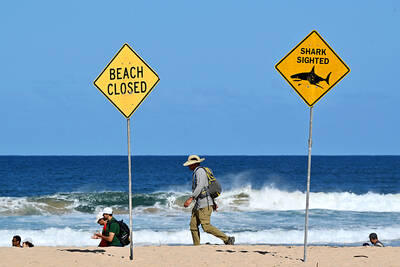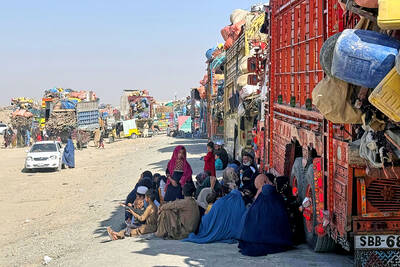Survivors and grieving relatives of victims yesterday held the first ceremonies marking one year since the Indian Ocean tsunami swept away at least 216,000 lives in one of the world's worst recent natural disasters.
Western tourists who returned to the beaches of southern Thailand where they were caught in the disaster were among hundreds of people who launched a boat laden with flowers, candles and incense to ward off evil spirits.
Ceremonies in Thailand yesterday were the first of hundreds due to be held to mark the disaster's grim anniversary in the dozen countries hit by the earthquake-spawned waves on Dec. 26 last year.
The mourning comes as survivors and officials take stock of the massive relief operation and peace processes in Sri Lanka and Indonesia's Aceh province, the two places hardest hit by the tsunami. In both cases, success has been mixed.
At Bang Niang beach in Thailand's Phang Nga Province, hundreds of mourners placed offerings into a brightly colored, bird-shaped boat that was floated into the Andaman Sea as members of the local Moken, or sea gypsy, community chanted and banged drums.
Peter Pruchniewitz, 68, who was swept from his hotel room and lost a friend to the waves a year ago, returned from Zurich, Switzerland, to attend anniversary ceremonies. Asked why, he said simply, ``to remember.''
In hardest-hit Indonesia, workers yesterday scaled the minarets of the imposing 16th century mosque in the provincial capital of Banda Aceh, replacing missing tiles and slapping on a fresh coat of whitewash in preparation for special services tomorrow.
The tsunami resulted in a cease-fire between the government and Aceh's separatist guerillas and thousands of people have moved into new homes built with some of the billions of dollars in foreign aid that poured in after the disaster.
But aid agencies say 80 percent of Indonesians who lost their homes are still waiting for a new one.
In Sri Lanka, troops yesterday patrolled the streets of the capital, Colombo, amid boosted security for ceremonies marking the tsunami's anniversary.
Disputes over aid delivery and an upsurge in violence blamed on separatist Tamil Tiger rebels have dashed hopes that the tsunami would bring a final end to the country's long-running civil conflict.
Exactly one year ago tomorrow, the most powerful earthquake in four decades -- magnitude 9 -- ripped apart the ocean floor off Sumatra, displacing millions of tonnes of water and spawning giant waves that spread in all directions, picking up speed as they neared land.
Almost 400,000 homes were reduced to rubble and more than 2 million people left without a place to live, according the UN. The livelihoods of 1.5 million were swept away.
The tsunami generated an unprecedented outpouring of generosity, with donor pledges reaching some US$13.6 billion.
Rebuilding has started in some places, and fishing boats and seeds have been handed out to kick-start ruined village economies.
But many refugee camps are still full, with residents relying on aid handouts to survive, and the UN and others have expressed concern about the pace of rebuilding.
The small Christian communities in tsunami-hit countries were preparing Christmas services yesterday, and Muslim clerics in Aceh urged people to keep their end of year celebrations solemn to respect the tsunami dead.

With much pomp and circumstance, Cairo is today to inaugurate the long-awaited Grand Egyptian Museum (GEM), widely presented as the crowning jewel on authorities’ efforts to overhaul the country’s vital tourism industry. With a panoramic view of the Giza pyramids plateau, the museum houses thousands of artifacts spanning more than 5,000 years of Egyptian antiquity at a whopping cost of more than US$1 billion. More than two decades in the making, the ultra-modern museum anticipates 5 million visitors annually, with never-before-seen relics on display. In the run-up to the grand opening, Egyptian media and official statements have hailed the “historic moment,” describing the

SECRETIVE SECT: Tetsuya Yamagami was said to have held a grudge against the Unification Church for bankrupting his family after his mother donated about ¥100m The gunman accused of killing former Japanese prime minister Shinzo Abe yesterday pleaded guilty, three years after the assassination in broad daylight shocked the world. The slaying forced a reckoning in a nation with little experience of gun violence, and ignited scrutiny of alleged ties between prominent conservative lawmakers and a secretive sect, the Unification Church. “Everything is true,” Tetsuya Yamagami said at a court in the western city of Nara, admitting to murdering the nation’s longest-serving leader in July 2022. The 45-year-old was led into the room by four security officials. When the judge asked him to state his name, Yamagami, who

DEADLY PREDATORS: In New South Wales, smart drumlines — anchored buoys with baited hooks — send an alert when a shark bites, allowing the sharks to be tagged High above Sydney’s beaches, drones seek one of the world’s deadliest predators, scanning for the flick of a tail, the swish of a fin or a shadow slipping through the swell. Australia’s oceans are teeming with sharks, with great whites topping the list of species that might fatally chomp a human. Undeterred, Australians flock to the sea in huge numbers — with a survey last year showing that nearly two-thirds of the population made a total of 650 million coastal visits in a single year. Many beach lovers accept the risks. When a shark killed surfer Mercury Psillakis off a northern Sydney beach last

‘NO WORKABLE SOLUTION’: An official said Pakistan engaged in the spirit of peace, but Kabul continued its ‘unabated support to terrorists opposed to Pakistan’ Pakistan yesterday said that negotiations for a lasting truce with Afghanistan had “failed to bring about a workable solution,” warning that it would take steps to protect its people. Pakistan and Afghanistan have been holding negotiations in Istanbul, Turkey, aimed at securing peace after the South Asian neighbors’ deadliest border clashes in years. The violence, which killed more than 70 people and wounded hundreds, erupted following explosions in Kabul on Oct. 9 that the Taliban authorities blamed on Pakistan. “Regrettably, the Afghan side gave no assurances, kept deviating from the core issue and resorted to blame game, deflection and ruses,” Pakistani Minister of